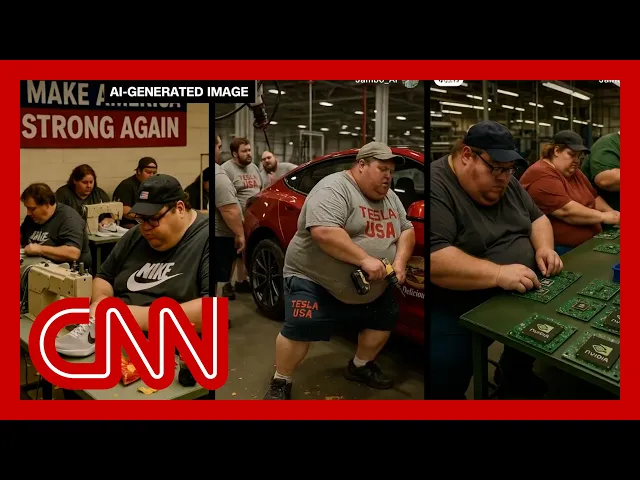Chinese internet users mock Trump tariffs with AI videos of American sweatshops

Americans in sweatshops: AI's political twist
The 2024 election cycle is colliding with the AI revolution in ways that continue to surprise observers. In a fascinating development, Chinese internet users are deploying AI-generated videos to mockingly depict Americans working in sweatshop conditions—a satirical response to Donald Trump's proposed 60% tariff on Chinese imports. These videos flip the traditional narrative, showing Americans as the low-wage factory workers while Chinese managers oversee operations.
Key dimensions of this phenomenon
-
Chinese netizens are creating and sharing AI-generated videos portraying American workers in factory settings with signs like "Made in USA" alongside Chinese supervisors—an intentional role reversal designed to mock tariff proposals.
-
The videos directly respond to Trump's campaign promise of imposing steep tariffs on Chinese goods, using visual satire to suggest Americans would be forced into low-wage manufacturing jobs under such policies.
-
This represents a new frontier in political discourse where AI-generated content becomes a vehicle for international commentary and mockery, bypassing traditional media channels.
The blurring line between AI and geopolitical messaging
What makes these videos particularly noteworthy isn't just their content but what they represent about the evolution of international discourse. We're witnessing the democratization of propaganda tools through consumer AI. Previously, creating convincing visual media required significant resources typically available only to state actors or major media organizations. Now, individual internet users can produce visually compelling political commentary that can rapidly spread across borders.
The videos don't merely reflect anti-American sentiment but demonstrate a sophisticated understanding of economic interconnectedness. The creators are implicitly arguing that Trump's protectionist policies would harm American consumers by forcing domestic production at higher costs. They're crafting a narrative that positions China as the economic rational actor and the U.S. as pursuing self-defeating policies—all through humorous but pointed visual storytelling.
This represents a significant shift in cross-border political communication. Chinese citizens are directly engaging with and commenting on American politics using the language of memes and viral content rather than formal diplomatic channels. It suggests a growing confidence among Chinese netizens in participating in global political discourse, albeit from behind their country's firewall.
Beyond the immediate controversy
While these videos have captured attention for their immediate political commentary, they highlight broader trends worth examining. The
Recent Videos
How To Earn MONEY With Images (No Bullsh*t)
Smart earnings from your image collection In today's digital economy, passive income streams have become increasingly accessible to creators with various skill sets. A recent YouTube video cuts through the hype to explore legitimate ways photographers, designers, and even casual smartphone users can monetize their image collections. The strategies outlined don't rely on unrealistic promises or complicated schemes—instead, they focus on established marketplaces with proven revenue potential for image creators. Key Points Stock photography platforms like Shutterstock, Adobe Stock, and Getty Images remain viable income sources when you understand their specific requirements and optimize your submissions accordingly. Specialized marketplaces focusing...
Oct 3, 2025New SHAPE SHIFTING AI Robot Is Freaking People Out
Liquid robots will change everything In the quiet labs of Carnegie Mellon University, scientists have created something that feels plucked from science fiction—a magnetic slime robot that can transform between liquid and solid states, slipping through tight spaces before reassembling on the other side. This technology, showcased in a recent YouTube video, represents a significant leap beyond traditional robotics into a realm where machines mimic not just animal movements, but their fundamental physical properties. While the internet might be buzzing with dystopian concerns about "shape-shifting terminators," the reality offers far more promising applications that could revolutionize medicine, rescue operations, and...
Oct 3, 2025How To Do Homeless AI Tiktok Trend (Tiktok Homeless AI Tutorial)
AI homeless trend raises ethical concerns In an era where social media trends evolve faster than we can comprehend them, TikTok's "homeless AI" trend has sparked both creative engagement and serious ethical questions. The trend, which involves using AI to transform ordinary photos into images depicting homelessness, has rapidly gained traction across the platform, with creators eagerly jumping on board to showcase their digital transformations. While the technical process is relatively straightforward, the implications of digitally "becoming homeless" for entertainment deserve careful consideration. The video tutorial provides a step-by-step guide on creating these AI-generated images, explaining how users can transform...
